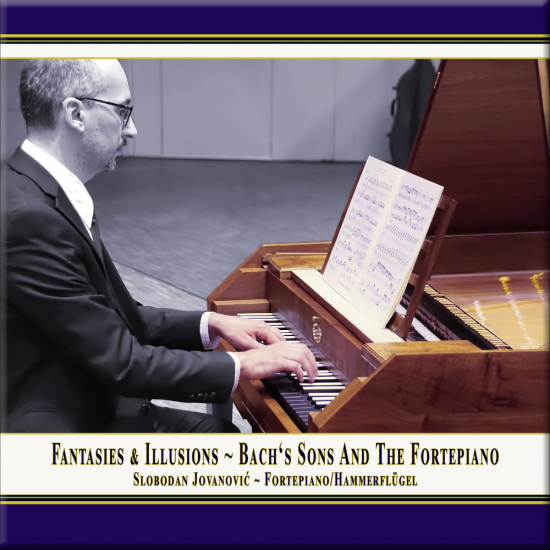Fantasies & Illusions ~ Bach's Sons and the Fortepiano
Bach's Sons and the Fortepiano
Slobodan Jovanović (Fortepiano/Hammerflügel) plays
Carl Philipp Emanuel Bach (1714-1788):
Sonata No. 4 in A Major, Wq 55,4 (H. 186), from: "For Connoisseurs & Amateurs", 1st Collection
& Fantasia in F-Sharp Minor, Wq 67 (H. 300) "C.P.E. Bach's Impressions"
Wilhelm Friedemann Bach (1710-1784):
12 Polonaises, Falck 12 & Fantasia in A Minor, Falck 23
Slobodan Jovanović (*1977):
Iluzija
A recording from the Laurentius Church in Karlsruhe (Germany)
HD Recording · DDD · Duration: c. 79 Minutes



S
lobodan Jovanović was born in 1977 in Pančevo (Serbia). He studied harpsichord and clavichord with Robert Hill and basso continuo with Michael Behringer in Freiburg i. Br. In Karlsruhe he studied fortepiano and chamber music with Kristian Nyquist. He is also trained as a professional organist. Alongside harpsichordists Colin Tilney und Huguette Dreyfus he attended various master classes as a scholarship holder. As well as this he perfected his basso continuo under Jesper Bøje Christensen.
Slobodan Jovanović has appeared in most European countries as a sought after chamber music partner and soloist. He performed as a continuo player with conductors like Reinhard Goebel, Radoslaw Szulc and in several ensembles and orchestras, among them with La Folia, L'arpa festante, Mannheimer Mozartorchester, Nationaltheater-Orchester Mannheim as well as with the Karlsruher Barockorchester. Since several years he is also accompanist (répétiteur) with the International Händel-Akademie in Karlsruhe (Germany). During the season 2016 und 2017 Jovanović played, among other music, all six Brandenburg Concertos by J.S. Bach in diverse concerts with Philharmonie Baden-Baden - as part of the cooperation with this orchestra.
In 2002 he made his debut on ARS MUSICI label with harpsichord sonatas by Franz Anton Maichelbeck (1702-1750). The "harpsichord live electronic" project, with music from the composer Roland Breitenfeld, was brought out on CD (new works for harpsichord and live electronics) in 2001 with Slobodan Jovanović on harpsichord. Recordings of his own harpsichord compositions followed in 2004. His own chamber music has been released in 2014 on the label IFO classics (CD audio Album: "Scene In Circle" with the german label IFO classics, performed by Ensemble Serene Destination. IFO 00 222). In July 2016 his second CD with IFO classics has been released (audio album "Images Without Frames", IFO 00 551), this time with harpsichord work by Frescobaldi, Froberger and Louis Couperin, as well with his own cycle for harpsichord Images Without Frames.
As a composer Slobodan Jovanović consistently pursues the idea of fusion of musical styles and tonal languages. In spring 2014 he started a large scale project, Evelasting Opera, in which over the long term various self-contained vocal-instrumental works ("opera") are to be created.
The concert grand piano is incontestably the king of instruments. We could now wax lyrical about its incomparable dynamics and go into its ability to go from the tenderest of sounds in a soft minor key to the magnificent power of a fortissimo, or I could rhapsodise about its impressive size and elegance. But what makes this instrument really fascinating is its individuality, since each one is unique in itself - created by a master. A concert grand has a life all of its own that a virtuoso can really "get into" and hence bring the work of the composer to life. In our Grand Piano Masters Series, we get into the character and soul of the concert grand piano and experience, during the performance itself, the dialogue between the instrument, the virtuoso and the performance space.
Andreas Otto Grimminger & Josef-Stefan Kindler, K&K Verlagsanstalt
Carl Philipp Emanuel Bach (1714-1788):
Sonata No. 4 in A Major, Wq 55,4 (H. 186)
from: "For Connoisseurs & Amateurs", 1st Collection
1. Allegro assai [4:03] · 2. Poco adagio [4:24] · 3. Allegro [7:31]
Carl Philipp Emanuel Bach (1714-1788):
4. Fantasia in F-Sharp Minor, Wq 67 (H. 300) [11:27]
"C.P.E. Bach's Impressions" / "C.P.E. Bachs Empfindungen"
Wilhelm Friedemann Bach (1710-1784):
5. Polonaise in D Major, Falck 12, No. 3 [4:25]
6. Polonaise in G Minor, Falck 12, No. 12 [2:40]
7. Polonaise in G Major, Falck 12, No. 11 [2:51]
8. Polonaise in E Minor, Falck 12, No. 8 [5:19]
9. Polonaise in E Major, Falck 12, No. 7 [3:13]
10. Fantasia in A Minor, Falck 23 [3:37]
11. Polonaise in D Minor, Falck 12, No. 4 [2:13]
12. Polonaise in F Major, Falck 12, No. 9 [2:21]
Slobodan Jovanović (*1977):
13. Iluzija (1996) [5:05]
World Premiere Recording
Wilhelm Friedemann Bach (1710-1784):
14. Polonaise in F Minor, Falck 12, No. 10 [3:41]
15. Polonaise in E-Flat Minor, Falck 12, No. 6 [4:09]
16. Polonaise in E-Flat Major, Falck 12, No. 5 [4:15]
17. Polonaise in C Minor, Falck 12, No. 2 [4:02]
18. Polonaise in C Major, Falck 12, No. 1 [4:18]
Fortepiano by Susanne Merzdorf, 2017 (after Anton Walter, 1782)
Recorded in the Laurentius Church in Karlsruhe (Germany), October 1-3, 2017
Recording & Editing: Hanns Wissert
Images by Nico Roller (Frontcover & Booklet Page 2-3),
Helmut Jacobs (Booklet Page 4-5) & Hanns Wissert (Booklet Page 6-7)
Production & Mastering: Andreas Otto Grimminger & Josef-Stefan Kindler
Artwork & Coverdesign: Josef-Stefan Kindler
Many thanks to Susanne Merzdorf, Ruth Schwarz, Pastor Siegfried Weber
and the Laurentius Parish in Karlsruhe (Germany).

Featured by Spotify
This release is featured in the editorial Spotify playlist of handpicked new classical releases - August 2, 2019

**** Marvelous music, played with verve and dazzling dexterity
The Bach sons referenced, in this album's title, Fantasies & Illusions - Bach's Sons and the Fortepiano, are Carl Philipp Emanuel Bach and his older brother Wilhelm Friedemann. The pianist for this disc, Serbian-born Slobodan Jovanovic, also contributes a brief piece, and penned the extensive program notes about the music. Unfortunately, they are printed in German only, a language I barely know, so I cannot comment on their usefulness. What I can report with confidence is that the music is marvelous, and Jovanovic plays it with verve and dazzling dexterity. The chief thing to know about the Bach boys is that, despite having been instructed almost exclusively by their great father, the music that they produced represented a distinctive break from the world of the Baroque. C. P. E. Bach gives us rather more imaginative and lively music than his sibling, especially so in the fast outer movements of the Classically designed sonata. This music is bursting with joy. But he was also capable of considerable depth and repose, as in the beautiful Adagio of the sonata. The large Fantasia, clocking in here at 11 and a half minutes, is a work of extraordinary inventiveness, and most likely represents a setting down of one or more of the improvisations that the composer was widely renowned for. To my ears it sounds like a precursor to the Rondo in A Minor of Mozart.
Wilhelm Friedemann Bach's polonaises are not as zesty as C. P. E.'s works, but just as expertly constructed, with an added layer of gracefulness that sets them apart. The polonaise format was very popular in late 18th century Germany, although these brief, lighthearted pieces have nothing in common with the massive works that Chopin was to create in the same name a generation later. I first encountered this music many years ago at a live performance by the superb American fortepianist Andrew Willis. There are only a handful of recordings of this delightful music available (alas, Willis not among them), and so this new recording is very welcome, especially given the fine recorded sound and the superbly colorful palette of Susanne Merzdorf's excellent reproduction of a 1782 Anton Walter instrument.
Jovanovic's own music, which dates to 1996, is quirky but intriguing, reminding me of a music box that starts out with a simple, sing-song tune, then begins to malfunction, leading it into odd key changes and rhythmic hiccups before somehow fixing itself and returning to proper working order. He rather bravely inserts the five-minute piece among the polonaises, but despite vast stylistic differences, there is a sense of mutual intellectual curiosity that tends to make the whole sequence flow surprisingly smoothly.






**** Marvelous music, played with verve and dazzling dexterity
24. February 2020 - 15:31 — kuk-art.comWilhelm Friedemann Bach's polonaises are not as zesty as C. P. E.'s works, but just as expertly constructed, with an added layer of gracefulness that sets them apart. The polonaise format was very popular in late 18th century Germany, although these brief, lighthearted pieces have nothing in common with the massive works that Chopin was to create in the same name a generation later. I first encountered this music many years ago at a live performance by the superb American fortepianist Andrew Willis. There are only a handful of recordings of this delightful music available (alas, Willis not among them), and so this new recording is very welcome, especially given the fine recorded sound and the superbly colorful palette of Susanne Merzdorf's excellent reproduction of a 1782 Anton Walter instrument.
Jovanovic's own music, which dates to 1996, is quirky but intriguing, reminding me of a music box that starts out with a simple, sing-song tune, then begins to malfunction, leading it into odd key changes and rhythmic hiccups before somehow fixing itself and returning to proper working order. He rather bravely inserts the five-minute piece among the polonaises, but despite vast stylistic differences, there is a sense of mutual intellectual curiosity that tends to make the whole sequence flow surprisingly smoothly.
February 2020
Featured by Spotify
3. August 2019 - 11:47 — kuk-art.comhttps://open.spotify.com/playlist/37i9dQZF1DWV0gynK7G6pD